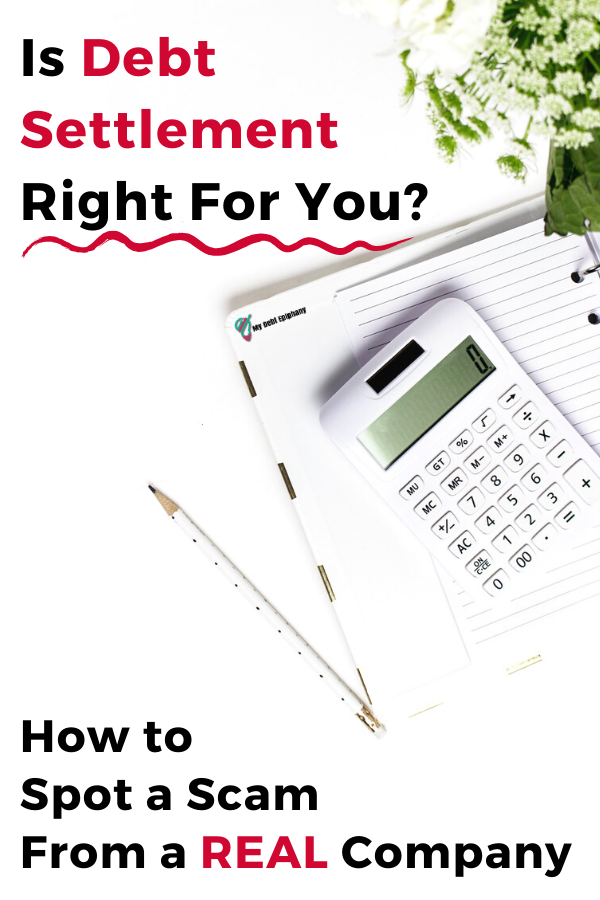How Bad Are Debt Settlement Companies?
I’ve received a few messages from readers asking about debt settlement companies and debt repair programs. One reader even shared how she got tricked by a debt settlement company that simply took her money and didn’t help her get rid of any debt at all. So what’s the deal? How bad are debt settlement companies? Are there any good ones to consider?
When you’re deep in debt and struggling to make payments, it can seem like there isn’t a light at the end of the tunnel.
Many people in debt feel overwhelmed and trapped by the weight of their financial burden but there are many options to help you dump this financial challenge. Trust me, I know.
When it comes to repaying what you owe, debt settlement companies have gained massive popularity in recent years and while it seems like a fantastic solution there are definitely pitfalls that consumers need to be wary of.
Keep reading to find out what to look out for and protect yourself from becoming a victim of a debt settlement scam.
Table of Contents
What Does a Debt Settlement Company Do?
Debt settlement companies negotiate with creditors to reduce the amount you have to repay. If you’re struggling to make payments on a debt or can no longer make payments, odds are your account might go into collections. This will hurt your credit, but it will also means the problem will not just go away.
Considering a debt settlement company is the last resort because companies will often ask you to stop making debt payments to help prove to the creditor that you can’t afford it. As a result, you may rack up late fees and interest charges. Debt settlement companies may also ask that you pay them instead to help you negotiate and some may even charge a fee if the debt is successfully settled.
To top it off, you still have to pay off the debt even if it’s a reduced amount.
Debt Settlement vs. Debt Consolidation
As you embark on your debt payment journey, it’s important to know the options you have and the differences between them. Here are the key points and differences between these two debt reduction methods.
Debt Settlement:
- Reduces your debt by negotiating with lenders rather than seeking a consolidation loan
- Can be done by yourself or through a credit counselor
- Usually offers a lower amount to pay off and a lump-sum payment
- It is an unsecured debt repayment strategy so your credit accounts are closed and you don’t have access to credit during the program
- Helpful in reducing the total amount of debt you owe
Debt Consolidation:
- Reduces your debt by putting all of your previous debts into one consolidation loan with one interest rate
- Mostly provided through a financial institution such as a bank or credit union
- Usually requires an asset to secure the loan i.e. your house, car, or retirement account
- Helpful in reducing the total number of creditors you owe
Regardless of the selection you make they both affect your credit score, require additional money in fees or interest and are usually long term programs of a few years.
Red Flags To Look Out For With Debt Settlement
While there are many great debt settlement companies to work with, there are still a few out there to be wary of.
Here are some alarm bells to be mindful of when searching for a debt settlement company to help you:
Large, Upfront Fees
If they are asking for a surprising amount of money right away before any actual debt repayment has taken place you should think twice.
Bold & Very Specific Claims
A reputable debt settlement company won’t make bold claims such as debt reduction of 70% to 80% and rather than ask you for upfront fee payment, they will add a percentage of their fee to each of your monthly payments.
In addition, they won’t collect any of this percentage fee until they have actually settled all of your debts. This offers a 100% satisfaction guarantee because you could drop out of the repayment program at any time for any reason and not pay them a penny.
Certifications
Beware: some companies will make false claims about being a government-approved program to help with bailing out consumers with personal credit card debt. They may even go as far as using government seals and logos.
Promises of Ease
Anytime you have to attack your debt, there are pros and cons. Scam debt settlement companies usually paint a picture of complete ease, a fast reduction of your debt and no real pain or consequence at all.
Not-For-Profit Status
Debt consolidation can be presented as a not-for-profit without that being true. Be sure to dive deeper into this status especially if you are being asked to pay large fees and retainers. There are many stories of people who fell victim to debt settlement company scams because of these points so be sure to do your due diligence.
How To Protect Yourself
As you search for a reputable debt relief company to work with you must know what to look for to protect yourself from further financial and emotional damage. Here’s how.
Do A Background Check
Look at reviews on reputable sites such as the Better Business Bureau or Consumer Affairs to see if any valid complaints are raised against the company. Also, ask others who you know have consolidated their debt or researched it for their personal reviews.
Ask Questions
Dive deep into their fees, what you get from their program, the company history and licensing in particular. If there is something that isn’t clear or you don’t understand about the process be sure to speak up.
There are many terms and numbers that get thrown around as you meet with debt consolidators so write down both your questions and the answers to keep track to help with your decision making. Also, shop around and don’t feel pressured to commit to any services.
Know Your Rights & Sources For Help
The Federal Trade Commission’s Bureau of Consumer Protection is a great resource to learn more about what you should be wary of, how you’re protected and the groups set up to help you if an issue arises.
Things To Keep In Mind
In 2010, the FTC began to crack down on debt relief scams and because of their stringent inspection, it’s now actually safer and cheaper than ever to settle your debt.
However, you need to remember that although you may be feeling strained financially to honor your debt payment obligations, consolidating your debt should be a last resort because there are several downsides such as credit score decline, paying fees and possible taxes, as well as no guarantee of success as some companies may not negotiate with the particular company you want to work with or any debt settlement companies for that matter.
If you’re over $10,000 in debt, behind on payments by 4 to 5 months, you have creditors or collectors contacting you, you don’t have a secure asset to offer, and you’ve explored at least 3 other options such as consumer credit counseling, filing for bankruptcy and doing it yourself with or with help of a lawyer, then you should consider debt settlement. To help you discover the best solution for you, speak to an accredited/licensed credit counselor.
There are many ways to pay off your debts in a smart and safe way. If you are sure to do your due diligence you’ll be able to find the best method for your particular debt situation.
Alternatives to Using a Debt Settlement Company
Debt Management Plan
A Debt Management Plan is a program that is aimed at helping you pay off your debt. It’s usually a free program offered through a credit counselor or a similar source. However, it’s important to realize that you can create your own debt management plan on your own as well.
- Adopt a stricter budget – even if it’s just temporary. Check out my ultimate guide to budgeting here.
- Call your creditors. See who will be lenient or who has a financial relief program available. This can give you more time and breathing room to get a handle on your debt.
- Develop a debt payoff strategy. Trying to pay off everything at once can seem daunting. Instead, prioritize your debt by determining what you’ll focus on first.
- Cut expenses and live like a pauper. While I do firmly believe you can pay off debt and still have a life, it’s also important cut expenses and avoid any extra splurges if you are struggling to make debt payments. Even if you’re able to save just $50 and redirect it toward debt, this can help you avoid negative marks on your credit as well as filing for bankruptcy.
- Stop collection calls. If you do have accounts in collections, it’s important to understand your rights under the FTC. A collection agency can’t lie to you or threaten you. They also can’t call you before 8 am or after 9 pm. They also can’t call your employer if your employer doesn’t approve of the calls. The best part is that collection agencies can’t call you at all if you request in writing that they communicate with you only through email. You don’t need to hire anyone to get collection companies to stop calling you. You have rights under the FTC and just need to reinforce them.
Related: 70 Ways to Save More Money While Living Paycheck to Paycheck
Creating a Student Loan Debt Plan of Attack
How to Manage Loans so You Become Debt Free
50 Everyday Expenses You Need to Stop Spending Money On
Get a Balance Transfer
If your credit card debt is getting out of control and your credit score is still okay, you may be able to qualify for a balance transfer. With this option, you can transfer your existing credit card balance to a card that offers a 0% APR for a promotional period. I once did this with a card that had a $5,000 balance on it and saved me a ton of money.
Had I kept paying credit card interest, it would have been extremely hard to catch up and pay off the balance. With a balance transfer, it basically turned into a 0% interest loan and I was able to budget accordingly and chip away at the balance before the 0% APR promotion ended in 12 months. Credit.org also offers free credit coaching if you need help implementing a strategy to pay off your credit card debt.
Negotiate Your Own Debt
Yes, this is an option if you feel comfortable doing this and advocating for yourself. Negotiating your own debt could help you avoid fees that a debt settlement company would charge. However, creditors are not obligated to negotiate with you or comply with any terms you propose.
Still, if you’re organized, know your rights, and understand how debt settlement works, you may be able to pull it off. Check out this in-depth guide on negotiating your debt from NerdWallet.
Have you ever settled or consolidated your debt? What was your experience? What tips can you provide to others?
Stop Worrying About Money and Regain Control

Join 5,000+ others to get access to free printables to help you manage your monthly bills, reduce expenses, pay off debt, and more. Receive just two emails per month with exclusive content to help you on your journey.







